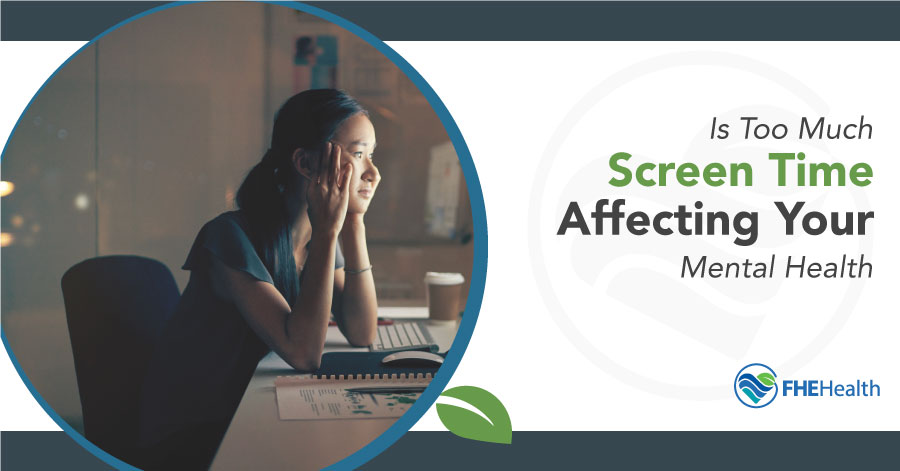
How much time do you spend in front of screens each day? The average screen time, by age, can be surprising for most people. People spend numerous hours each day in front of smartphones, laptops, tablets, and other devices for school, work, and recreation. Most people feel some guilt about the amount of time they spend looking at screens throughout the day.
FHE Health created a survey to gather and analyze data on how people are using screen time throughout their day. The survey also looked at people’s beliefs and habits regarding the use of screen time.
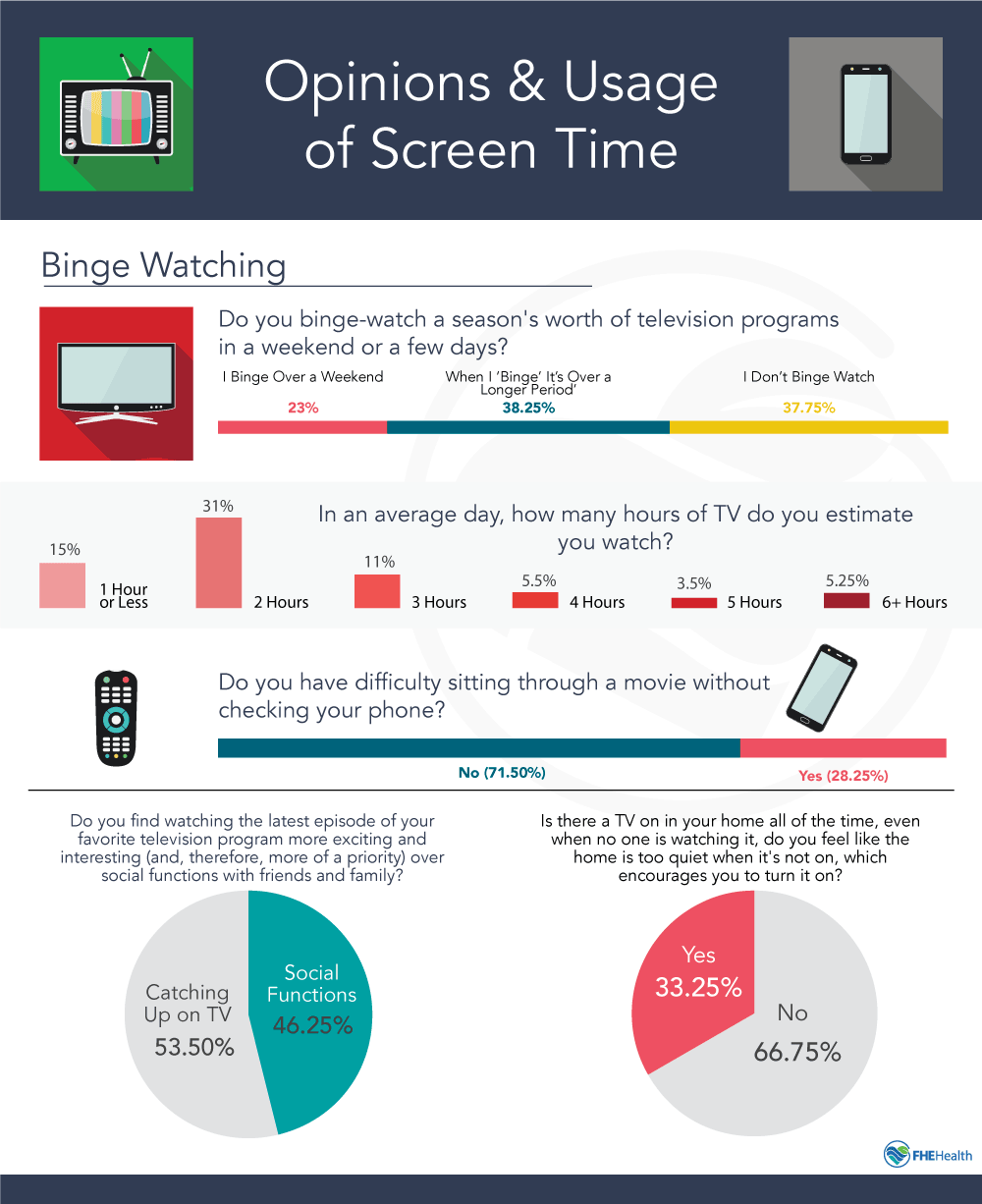
How Much Screen Time Are You Getting?
What is screen time, anyway? The term refers to the amount of time a person spends looking at displays such as TVs, computers, smartphones, tablets, gaming systems, and other digital screens. It also refers to the amount of time people engage in these activities rather than playing, spending time outdoors, or socializing in other ways. Are you addicted to phone use? You may be if you are always looking at your phone even if you’re using it just for work.
Often, it’s said that kids are addicted to screens, from watching television to using their phones or tablets to engage in recreational activities. Outlining how much screen time is normal isn’t easy to do, though.
There are recommendations that can provide some guidelines, but most parents set their own limitations for children. At the same time, most adults don’t limit their personal use of screens.
The American Academy of Pediatrics recommends balancing screen time with creative and physical play. For children between the ages of 2 and 5, it recommends no more than one hour per day of high-quality television programming. For those who are over the age of 6, the organization recommends creating consistent limits based on their other activities to ensure it screen time doesn’t take away from sleep and physical activities.
What about adults, though? The 2018 Nielsen Total Audience Report found that the average American adult spends more than 11 hours each day interacting with digital media in some way. This includes watching TV, reading something on a laptop, listening to media, or interacting in some other way with it. The same survey found young adults, those between the ages of 18 and 34, are spending as much as 43% of their free time using digital platforms.
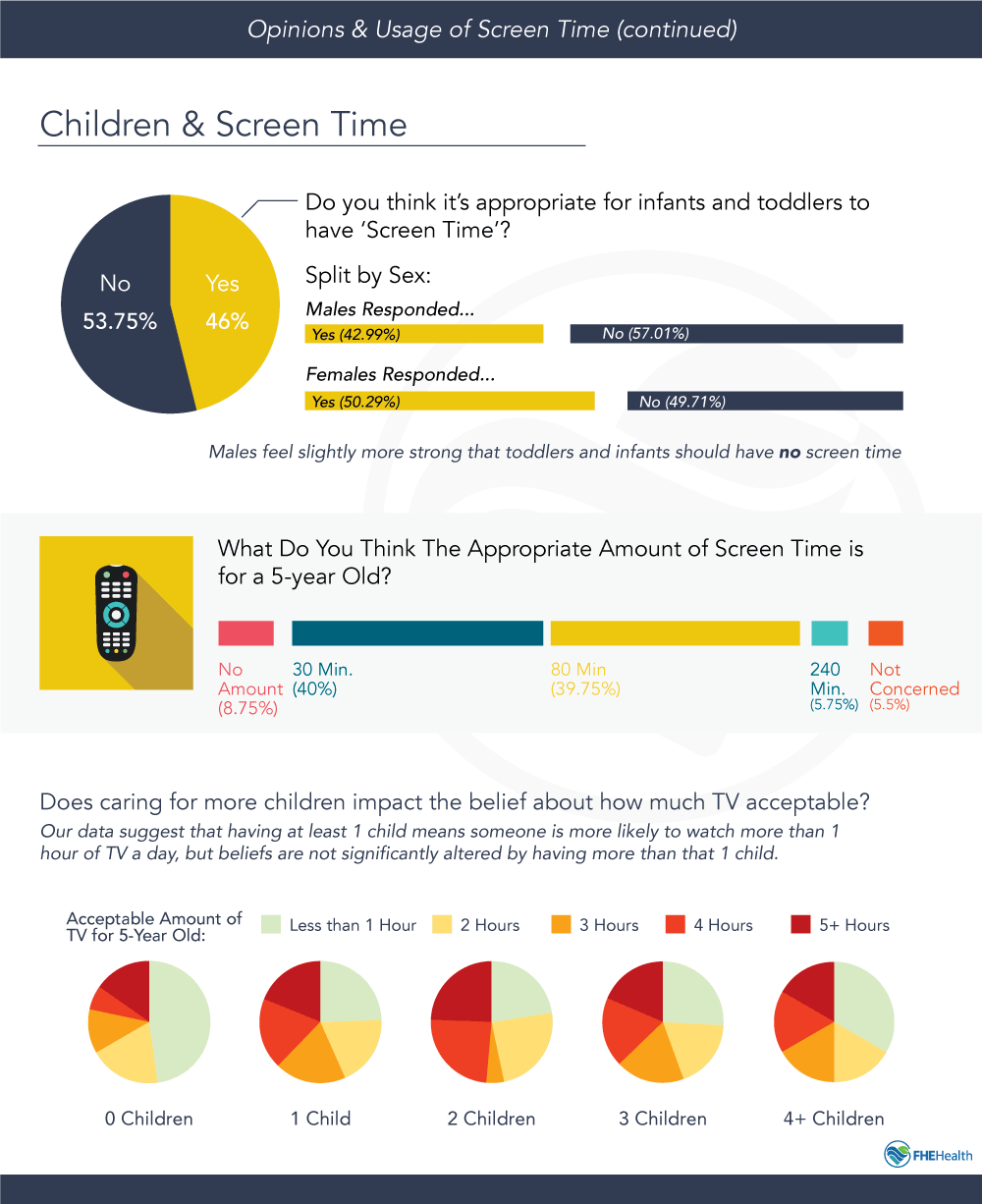
Why Data Is Incomplete and Often Misleading
It’s important to know that data on how much time a person spends using screens is rather limited in terms of accuracy. It relies on consumers self-reporting this information in most cases. Many people have no idea how much time they’re spending or aren’t willing to admit to higher levels of use.
It’s also not clear how multiple digital screens are counted when used at the same time. If a young adult is watching a movie but also interacting with their phone, how does that play a role in this research? Research like this is controversial and hard to use to create guidelines for screen time.
While it is important to understand what this number could be, it is even more valuable to understand what you are doing and how it impacts your quality of life and overall health.
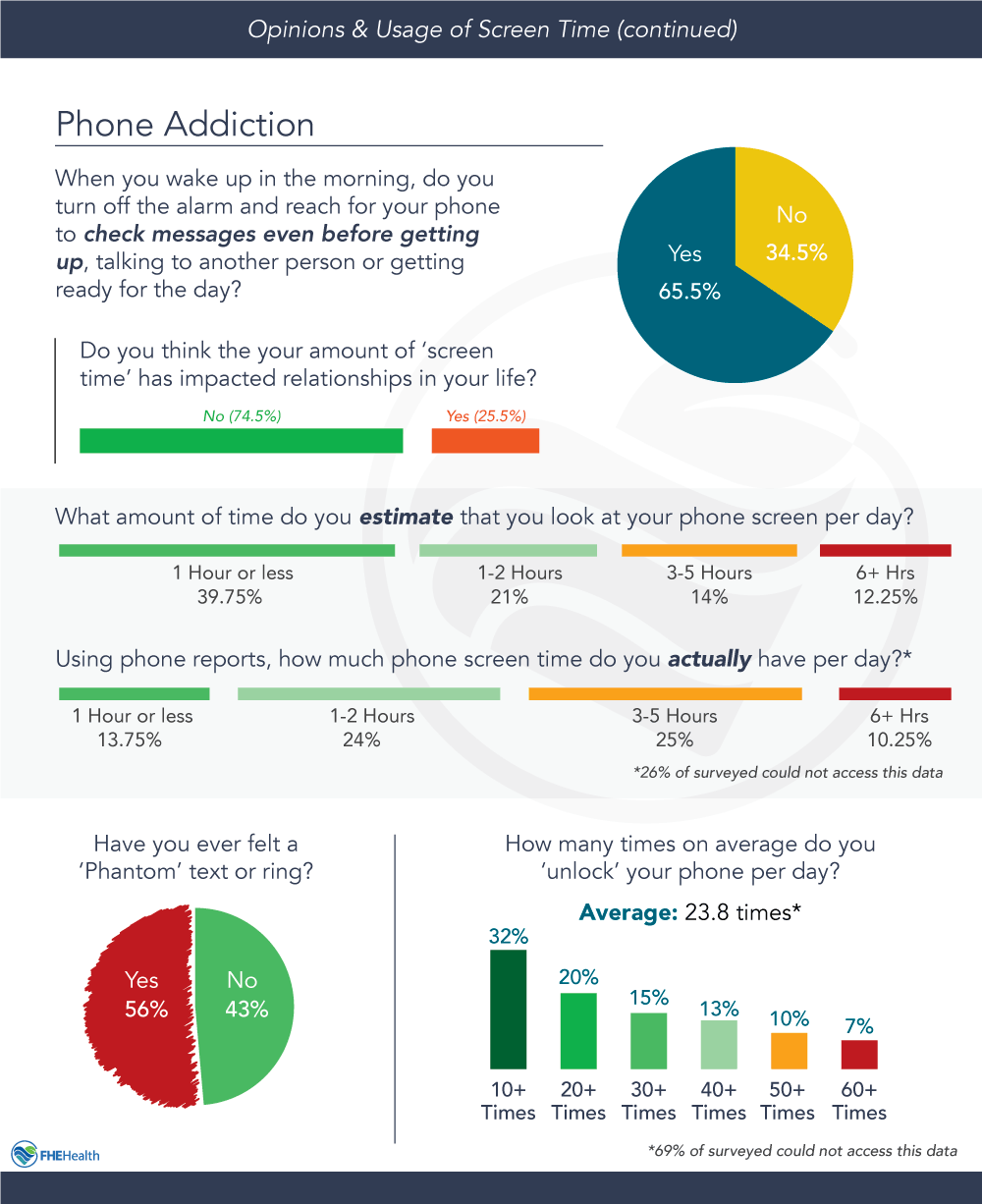
How Much Screen Time Is Healthy?
It’s hard to put a specific figure on this. The goal isn’t necessarily to eliminate the use of screens but to balance that time with other activities that are good for emotional, social and physical health.
In choosing to lie down to watch a movie, a person may be giving up time spent outside playing a sport, for example. The cost to a person’s health is that lack of movement rather than the damage that screen time itself may cause.
Consider the Risks to Your Health
Consider a few of the consequences of not reducing screen time. As noted previously, the average American adult spends at least 11 hours a day using screens. What are the implications?
Consider what too much screen time can do to children as a starting point. The U.S. National Library of Medicine states that the average American child spends three hours a day watching TV and five to seven hours a day in total digital screen time. It notes that the complications of this can include:
- Reducing a child’s ability to sleep well at night
- Increasing a child’s risk of gaining weight due to limited physical activity
- Raising the potential for mental health issues, including attention deficit disorders, anxiety, and depression
Children who spend a lot of time in front of a TV are more likely to eat unhealthy foods. They’re more likely to see ads for foods that are less desirable for a well-balanced diet. They are also less likely to be physically active and engage in imaginative play.
Many of these same risk factors can also be applied to adults who get too much screen time. The risks of complications can be numerous but may include physical ailments such as:
- Eyestrain
- Headaches
- Insomnia
- Neck pain
- Back pain
- Tendonitis or carpal tunnel syndrome
It also creates a higher possibility of reduced physical activity and exercise, leading to an increased risk of being overweight. Social media can also have a negative impact on a young adult’s mental health, especially when it comes to self-confidence issues and depression. Also, there may be a lack of socialization, often creating feelings of isolation and anxiety in social settings.
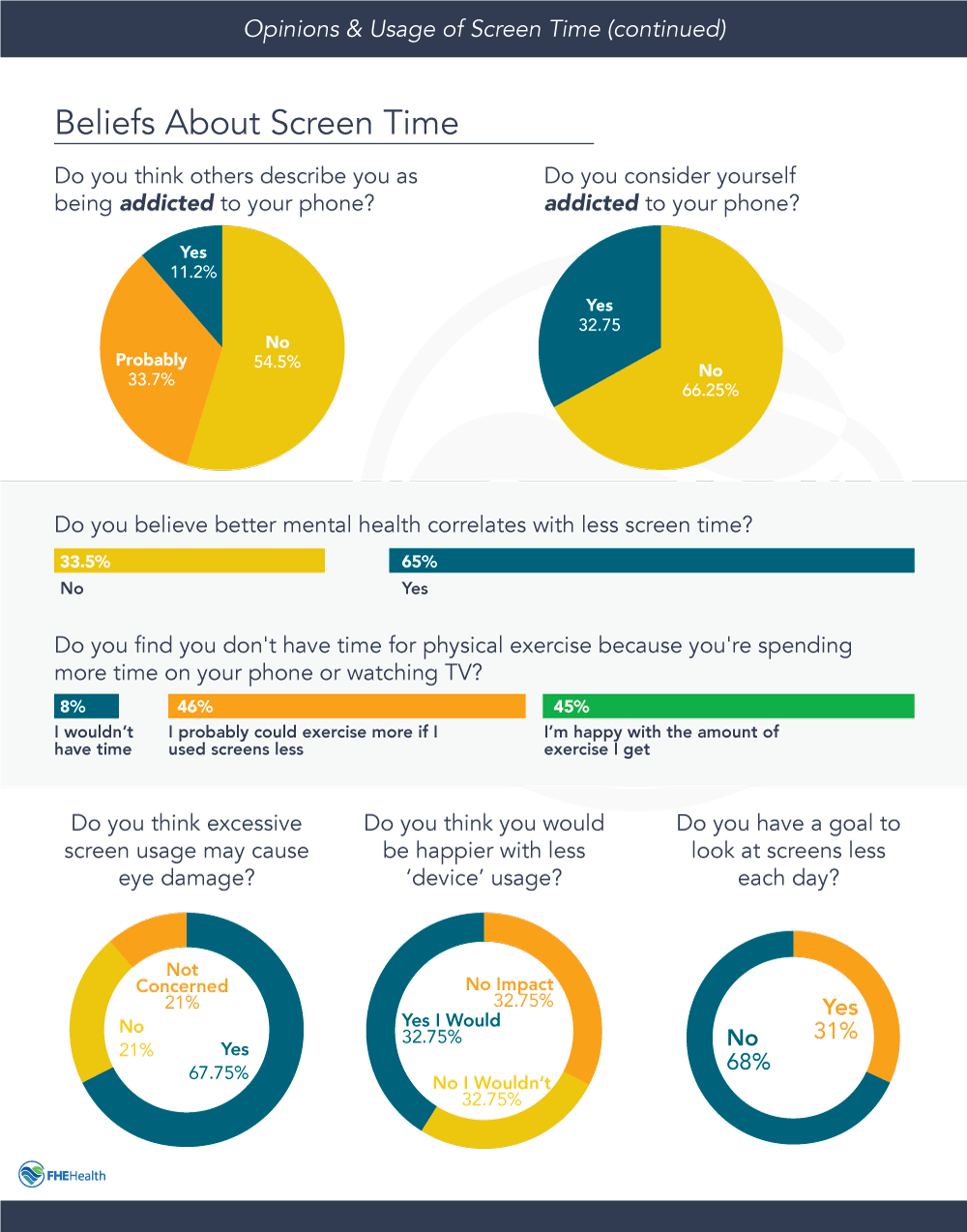
Tips for Cutting Down on Your Screen Time
Individuals who want to improve their quality of life should create their limitations. It’s not ideal for the average millennial who relies on their phone for work-related tasks to simply say an hour a day is enough.
It’s rather easy for a parent to see the benefits of reducing a child’s screen time. Turning off the TV and heading outdoors is simple enough to do.
Yet, when it comes to adult use, it isn’t as simple, especially when a person relies on their smartphone for communications at home and work. These are some actionable things you can do to reduce your screen time.
Take a Vacation from Screens for One Month
A good starting point to see the physical and emotional impact of screen time on an adult is to take a full one-month break from it. Use smartphones only while at work and only when necessary. Limit any other communication on these devices for that amount of time, aside from taking routine phone calls.
As difficult as this may be, it can provide a significant wake-up call, especially for those who believe they are addicted to their phone. It’s hard, but during that time, you can see what else you’ve been missing while using your devices. This may mean more intimate time with your family, more time spent engaging in nature and hobbies and more time exploring your own personality and interests.
By taking a break from screen use, you can also get a better understanding of how much of a role it plays in your life. Then, when you go back to using these devices, you’ll have a better appreciation for what else life has to offer, including emotional, social, and physical benefits outside the digital world.
Tips for Daily Screen Time Reduction
If getting rid of your phone for a month seems like an impossible task, work on smaller ways to reduce your dependency on screens instead. These tips are actionable, easy steps to get started. Work consistently to find other ways to reduce screen time.
- Don’t watch TV while lying in bed or on the couch. Try to stand and move around at least every 20 minutes.
- Avoid eating in front of the TV or while reading your smartphone. Break these two activities apart from each other.
- After work, put your phone down. Leave it on the counter or away from where you’ll spend time. Make that time count by going outside or doing something else that’s physical.
- Create no-phone rules for areas of the home. This may include, for example, the dinner table. This helps ensure everyone can share about their day and socialization within the family remains high.
- Spend more time going out to dinner, talking on the phone, visiting a friend’s home, or having a friend over to your home rather than spending that time on social media.
- If you feel the need to spend time on a laptop or computer, set a timer for 30 minutes. Force yourself to get up and turn it off after that point.
- Exercise for 20 minutes each morning before you pick up your phone to check your messages or catch up on social media.
Each of these steps can seem very challenging and nearly impossible. Yet, once you create a bit of distance from screens, you’ll see what you’re really missing.
All members of the family can contribute to a set of rules to reduce screen time. Find ways to ensure everyone is cutting back on the amount of time they’re spending on digital screens.
Do You Think You’re Addicted to Your Phone?
While true addiction to phones or screens isn’t common, the anxiety, depression, and other mental health challenges it creates are. If you’re facing mental health risks due to screen time, contact the counselors at FHE Health for guidance and support. Call our compassionate counselors at (833) 596-3502 for a consultation today.






